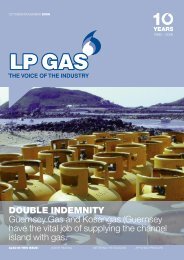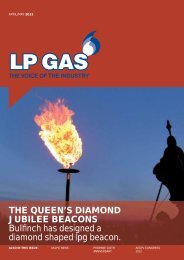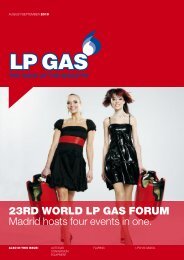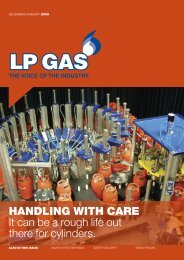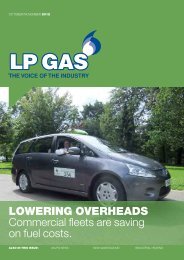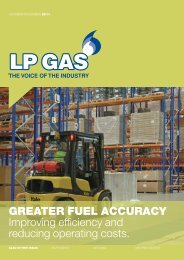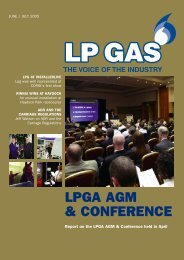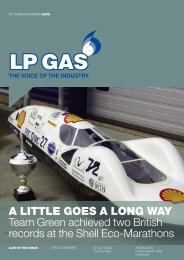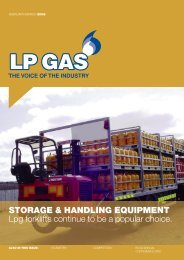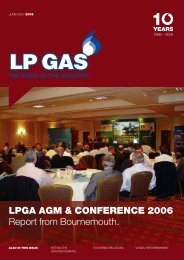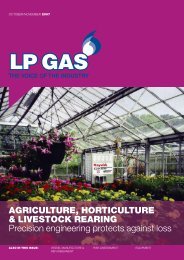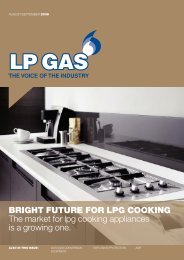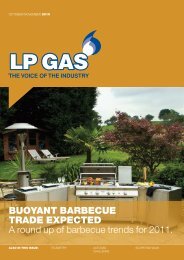C2572 02 Apr-May 06 AW - LP Gas Magazine
C2572 02 Apr-May 06 AW - LP Gas Magazine
C2572 02 Apr-May 06 AW - LP Gas Magazine
Create successful ePaper yourself
Turn your PDF publications into a flip-book with our unique Google optimized e-Paper software.
DIRECTOR GENERAL<br />
IT’S<br />
GOODBYE<br />
FROM ME…<br />
by Tom Fidell,<br />
director general, <strong>LP</strong> <strong>Gas</strong> Association<br />
After 13 years running the <strong>LP</strong> <strong>Gas</strong> Association,<br />
Tom Fidell will be retiring in early June this year.<br />
Here, he says farewell to the industry.<br />
Tom Fidell<br />
My first day at the <strong>LP</strong>GA was a cold<br />
morning at the beginning of March<br />
1993 and, after seeing the generally<br />
run-down condition of the office, I<br />
thought I had better check through<br />
the accounts to see how things<br />
stood financially.<br />
This quickly showed that the<br />
association would run out of money<br />
in October of that year and, with<br />
subscription income not coming in<br />
until the following January, there<br />
would be no money to pay salaries<br />
in November and December!<br />
We had a big exhibition coming up<br />
in Telford that was supposed to<br />
bring in lots of money for the <strong>LP</strong>GA,<br />
but bookings had not gone as well<br />
as forecast and it was now going to<br />
make a loss. However, the exhibition<br />
organiser was clearly going to make<br />
a big profit and some tough<br />
negotiations with this organiser soon<br />
turned things around in our favour,<br />
such that we would at least make<br />
some profit from this event.<br />
It now became apparent why I<br />
had got the job at the Association<br />
as, at the interview, I knew I had<br />
been in competition with some<br />
executive committee members - it<br />
was because the association was<br />
looking for someone who could run<br />
a small business and make it<br />
profitable!<br />
We needed a sustainable solution,<br />
which meant cutting costs and<br />
getting in more income and, to save<br />
money, one of the things we did was<br />
to not pay rent for several months<br />
and then negotiate a 50% discount.<br />
To raise income, we clearly needed<br />
to increase subscription levels and<br />
increase the number of members<br />
(not an easy combination) but, at a<br />
special meeting that year, we<br />
managed to agree an increase in<br />
subscriptions and membership<br />
actually started to increase.<br />
How different things are today,<br />
with more than double the number<br />
of members compared to 1993 and<br />
more than £0.75 million in the bank!<br />
Today we have also got<br />
substantial credibility with the<br />
Government and are able to call on<br />
ministers and senior government<br />
officials when we have a problem<br />
and believe that they can help us.<br />
Compared to those early days in<br />
1993 when we never even came<br />
close to seeing a minister, we now<br />
have sometimes half a dozen<br />
meetings per year with ministers,<br />
and even get them to come along to<br />
speak at our Conference and<br />
undertake promotional launches!<br />
Some of the highlights over the<br />
years are as follows:<br />
PUBLICATION OF <strong>LP</strong>GA<br />
CODES OF PRACTICE<br />
Back in 1996, the HSE used to<br />
publish lpg Codes of Practice and so<br />
did the <strong>LP</strong>GA. This was a duplication<br />
of effort and confusing for the<br />
industry. I met with the director<br />
general of the HSE to agree a<br />
strategy whereby one set of Codes<br />
would be published by the <strong>LP</strong>GA but<br />
would bear the HSC logo and<br />
endorsement, where appropriate.<br />
At that time, we also moved from<br />
subcontracting the publication of the<br />
Codes of Practice (where we did not<br />
have an income stream) to in-house<br />
publication, where the income<br />
stream often covers 20% of the total<br />
cost of running the association.<br />
The Codes are highly regarded by<br />
both industry and government, and<br />
are sold on a worldwide basis,<br />
where other countries now adhere to<br />
<strong>LP</strong>GA standards.<br />
Reg Shipman recieves his<br />
MBE from The Queen.<br />
MBE FOR REG SHIPMAN<br />
Reg had been our technical<br />
manager for many years and, when<br />
he retired in 1999, we applied for<br />
and obtained an MBE for him. Reg<br />
had worked tirelessly for the<br />
association and the MBE was well<br />
deserved.<br />
CLIMATE CHANGE LEVY<br />
The biggest lobbying campaign we<br />
have ever done was on the Climate<br />
Change Levy in 2000, when Pat<br />
Kennedy was our chairman and also<br />
the chief executive of Calor <strong>Gas</strong>. The<br />
CCL could have been very harmful<br />
for our industry. Pat and I worked<br />
very closely together, having<br />
numerous meetings with<br />
government ministers and officials,<br />
putting forward a strong case for a<br />
reduction in the CCL on lpg.<br />
Our efforts were rewarded with a<br />
reduction in the initial CCL from<br />
1.5p/litre to 1p/litre, and then a<br />
further reduction to 0.5p/litre which<br />
was, in fact, half the CCL that is<br />
applied to natural gas. We also<br />
managed to get cylinder gas<br />
excluded from the CCL.<br />
This achievement put the <strong>LP</strong>GA<br />
on the map as being one of the most<br />
effective lobbying organisations in<br />
the UK. As a result, other<br />
associations asked us how such a<br />
small organisation could achieve<br />
such results time and time again. We<br />
were asked to give presentations to<br />
other associations on how to lobby<br />
government to achieve a required<br />
result.<br />
At this time in 2000, the method in<br />
which the association worked was<br />
changed in line with our chairman’s<br />
suggestion, and the association<br />
became more focussed on lobbying<br />
and getting results, rather than trying<br />
to be an association of all things for<br />
all people. The Association today still<br />
operates very much in the mould<br />
that was set by Pat Kennedy back in<br />
2000.<br />
AUTOGAS<br />
It soon became clear that we<br />
needed an extra stream of gas<br />
usage to compensate for the decline<br />
in the cylinder market, and autogas<br />
seemed to be the ideal candidate.<br />
We prepared a strong<br />
environmental case for autogas and<br />
started to lobby the Government to<br />
get the fuel duty rate down and, in<br />
1995, achieved a 15% reduction.<br />
This was followed by a 25%<br />
reduction in 1996, a 29% reduction<br />
in 1999 and, finally, a 40% reduction<br />
in 2001. At the same time, petrol<br />
and diesel prices were rising, and we<br />
ended up with one of the most<br />
favourable fiscal regimes in the world<br />
for autogas.<br />
The market is continuing to grow<br />
at 7–8% per annum, and now<br />
represents about 10% of total gas<br />
sales, with autogas companies<br />
representing about one third of the<br />
total membership of the <strong>LP</strong>GA.<br />
In the early days, we needed to<br />
get some publicity to accelerate the<br />
growth of autogas. Our first<br />
achievement came in 1998, when<br />
the Queen converted her fleet of<br />
vehicles to lpg. We organised the<br />
10<br />
<strong>LP</strong> GAS MAGAZINE APRIL/MAY 20<strong>06</strong>



